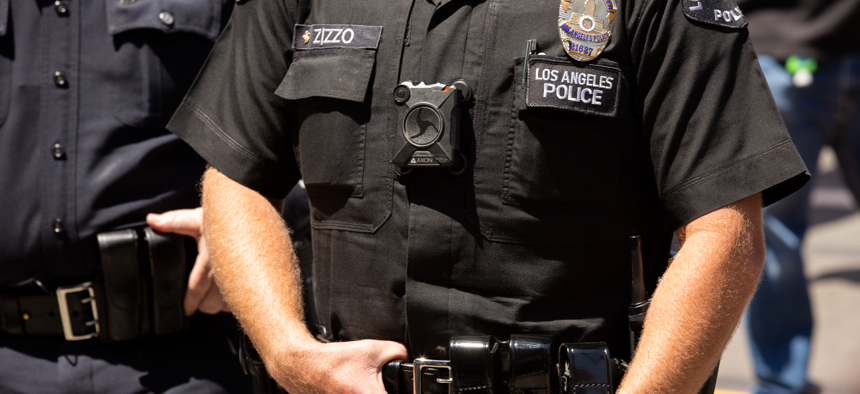
Soon all Justice Department law enforcement officers will wear body cameras, as many local police departments require. Above, a member of the Los Angeles Police Department. Matt Gush / istock
As Justice Dept Moves to Equip Its Officers with Body Cameras, IG Warns It's 'Unprepared'
Auditors expect implementation challenges with body cameras for federal officers due to inexperience.
As the Justice Department is preparing to launch a body camera policy for law enforcement officers across its components, its watchdog is warning the agencies are ill prepared for the initiative and could face significant implementation difficulties.
Justice components, such as the FBI; Bureau of Alcohol, Tobacco, Firearms and Explosives; U.S. Marshals Service; and Drug Enforcement Agency, have virtually no direct experience with body-worn cameras, its inspector general found, nor do those agencies have any policies for their use or implementation plans in place. Earlier this month while the IG was finalizing its report, Deputy Attorney General Lisa Monaco issued a new policy requiring the cameras for law enforcement officers engaged in executing search warrants and making pre-planned arrests.
“Over the course of our audit, we found that the components were generally unprepared to implement [body-worn camera] programs if required,” the IG said.
The IG extolled the benefits of implementing such a program, noting it would boost transparency and accountability among federal law enforcement. It could help the department during investigations, it added, including when probing allegations of excessive force or other constitutional violations by officers such as last year’s crackdown on protesters outside the White House as an example. Federal agents themselves could benefit from the cameras to combat false allegations, the IG noted.
Justice officials agreed with those benefits, but suggested associated costs would be significant and noted federal officers do not interact with the public as often as their state and local counterparts. Still, the U.S. Marshals Service made 90,000 arrests in fiscal 2019 alone and Justice officers discharged their firearms in 121 incidents between fiscal years 2018 and 2020.
The department previously found about 80% of non-federal law enforcement had instituted body camera policies and Justice itself funded many of them through $115 million in grants. Given the growing popularity and the public’s increased expectation of their use, the IG said “we believe that the DOJ should carefully reassess its lack of BWC programs for DOJ LEOs and pursue the actions necessary to prepare for program implementation.”
That implementation could take time, the IG warned, despite most components in recent years taking at least the step of soliciting cost estimates. It recommended a one-year pilot program to help Justice develop related policies, but even that timeline could be unrealistic. ATF officials estimated it would take the agency two years to stand up a body camera program, telling the IG, “We have no infrastructure, such as physical, technical, or storage-wise to implement.” The officials added: “We would be building from the ground up.”
Until 2019, Justice banned even local law enforcement working with its federal officers from wearing body cameras during joint operations. It has since launched a pilot program with a few cities to allow the local officers to wear cameras when their departments’ policies require them.
Justice components told the IG they would like to see a departmentwide body camera policy to guide them in establishing their own policies. The IG advised the department to address “cross-cutting policy issues” such as activation and deactivation, video retention, privacy concerns and public release. It suggested Justice examine whether it could achieve cost savings by setting up a single contract that all of its components could use. The auditors provided the department with assessments of body camera systems and steps for implementation, including training programs. Justice agreed with the IG’s recommendations.
Body camera use has generally not been implemented on a widespread basis by federal law enforcement, but some agencies have begun initiating their own programs. House Democrats have in each of the last two Congresses introduced legislation that included mandatory body cameras for federal officers as part of comprehensive police reform.







